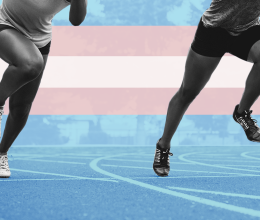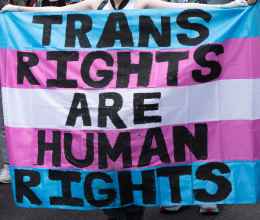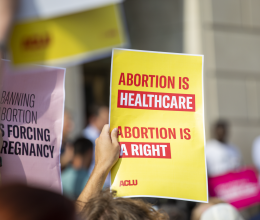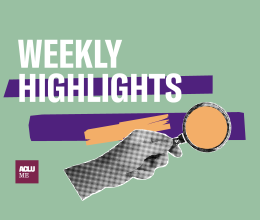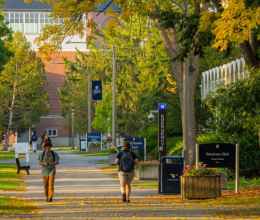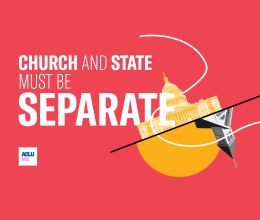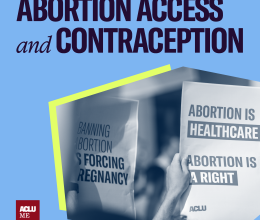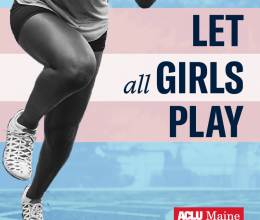Our partner profiles highlight the broad range of individuals and organizations we work with to advance and protect the rights of all people in Maine.
It’s an appropriately warm day in April and I’m at Omi’s Coffee Shop to meet Marvin Ellison. Ellison is a founder of the Religious Coalition Against Discrimination (RCAD) and current president of the RCAD’s Board. I am curious about his role in creating and working with a network of faith leaders from 18 different religious traditions with the purpose of standing up for human rights and civil rights. I ask about his connection to the American Civil Liberties Union and he responds, “I can’t remember a time when I didn’t know of or work with the ACLU.” Most recently, Ellison’s organization has cooperated with the ACLU of Maine on fighting LD 1428, a religious exemption bill.
As we sit down with our coffee, Ellison tells me that the RCAD has its roots in the early 90s when Maine was debating civil rights protections. Maine’s governor, John McKernan, vetoed an amendment to the Maine Human Rights Act to include protection from discrimination on account of sexual orientation. Riled by this debate, representatives of many faith traditions joined together to address civil rights for gay and lesbian people. The groups continued to work together for marriage equality for many years, and finally became a certified non-profit organization in 2010.
“Who are the members of this coalition?” I ask.
“Everything from reform & conservative Jews, Lutherans, Unitarian Universalists -- it runs the gamut! You just have to trust people to organize in their faith communities and then make connections together,” Ellison responds.
In addition to the ACLU of Maine, the RCAD often works in partnership with EqualityMaine, Maine People’s Alliance, Gay & Lesbian Advocates & Defenders (GLAD), and the Gay, Lesbian, Straight Education Network (GLSEN).
Ellison explains how one of the best-kept secrets is how many people of faith hold progressive values. “In every religious tradition except for the far conservative right, faith leaders are far more open than they are perceived … We live in an increasingly religiously illiterate society”. To illustrate, he mentions an op-ed article that he wrote last year for the Bangor Daily News titled “Transgender People Are a Blessing”, which received a vast number of online comments. One reaction to his piece was: “Rev. Ellison is not particularly christian by my understanding of christianity.” These responses struck Ellison. “Progressive” and “religious”, according to echoed sentiments, had to be opposing qualities.
More recently, Ellison noticed this assumption carried out when Rev. Sue Gabrielson testified in front of the Judiciary Committee on LD 1428 in January. The committee was to first hear from supporters of the bill, and then from opponents. When Gabrielson stood up as the first to testify against LD 1428, wearing a clerical collar, the Committee chair felt the need to clarify the schedule: “Excuse me, we are now ready to hear from opponents.” Gabrielson responded, “Yes, I know.”
Ellison recognizes that many faith leaders have difficulty translating their openness into public support for human rights and civil rights efforts. As an organization, the RCAD welcomes having a public profile, but Ellison notes that many people on the RCAD email list like to keep a low profile and work with the coalition quietly. For example, Ellison tells me, many Catholic priests have over the years supported LGBT rights and reproductive freedom, but those values are sometimes at odds with the Catholic hierarchy. “Many priests stand with the laity,” Ellison says.
Eager to learn more about Ellison’s personal motivation for his leadership of the RCAD, I ask: “How do you respond when someone questions your conviction and intertwined commitment to civil rights?”
"At the heart of any spirituality worth having is the call to love God, one another, and this precious earth. The public expression of love is to seek justice as right-relatedness in all our connections. I engage in advocacy for the common good not because I love politics, but because I love God and God's creation," Ellison replies.
Ellison expands upon his passion for advocacy and activism. “I grew up in the South in Tennessee and I came to my political adulthood because of the civil rights movement. I was a college student in the late 1960s – this was the time of Vietnam protests and the women’s rights movement. As a gay man, I have a primary interest in LGBT rights, but we can’t afford to fight only for our personal interests. It’s not that neat and tidy.” Currently, Ellison is working on a project with Planned Parenthood. The idea is to have clergy members available as support for women during abortion clinic hours. “It is important to organize clergy to support family planning work as Margaret Sanger did many years ago,” Ellison remarks. “And, it’s fun to show up where you are least expected.”

